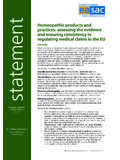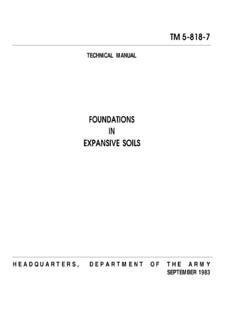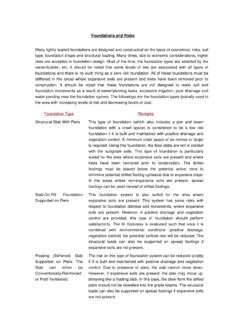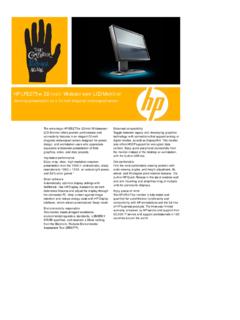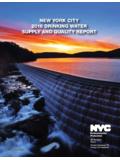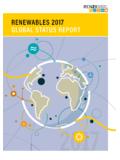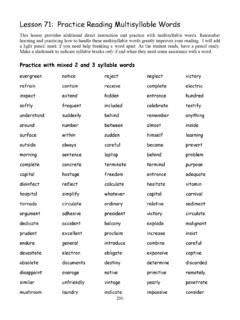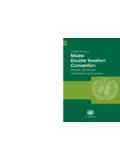Transcription of easac Homeopathic products and practices: …
1 Homeopathic products and practices | September 2017 | 1 Homeopathic products and practices : assessing the evidence and ensuring consistency in regulating medical claims in the EUSummaryEASAC, the European Academies Science Advisory Council, is publishing this Statement to build on recent work by its member academies to reinforce criticism of the health and scientific claims made for Homeopathic products . The analysis and conclusions are based on the excellent science-based assessments already published by authoritative and impartial bodies. The fundamental importance of allowing and supporting consumer choice requires that consumers and patients are supplied with evidence-based, accurate and clear information.
2 It is, therefore, essential to implement a standardised, knowledge-based regulatory framework to cover product efficacy, safety and quality, and accurate advertising practices , across the European Union (EU).Our Statement examines the following issues:Scientific mechanisms of action where we conclude that the claims for homeopathy are implausible and inconsistent with established scientific efficacy we acknowledge that a placebo effect may appear in individual patients but we agree with previous extensive evaluations concluding that there are no known diseases for which there is robust, reproducible evidence that homeopathy is effective beyond the placebo effect.
3 There are related concerns for patient-informed consent and for safety, the latter associated with poor quality control in preparing Homeopathic of homeopathy we note that this may pose significant harm to the patient if incurring delay in seeking evidence-based medical care and that there is a more general risk of undermining public confidence in the nature and value of scientific practice we conclude similarly that there is no rigorous evidence to substantiate the use of homeopathy in veterinary medicine and it is particularly worrying when such products are used in preference to evidence-based medicinal products to treat livestock make the following There should be consistent regulatory
4 Requirements to demonstrate efficacy, safety and quality of all products for human and veterinary medicine, to be based on verifiable and objective evidence, commensurate with the nature of the claims being made. In the absence of this evidence, a product should be neither approvable nor registrable by national regulatory agencies for the designation medicinal Evidence-based public health systems should not reimburse Homeopathic products and practices unless they are demonstrated to be efficacious and safe by rigorous The composition of Homeopathic remedies should be labelled in a similar way to other health products available: that is, there should be an accurate, clear and simple description of the ingredients and their amounts present in the Advertising and marketing of Homeopathic products and services must conform to established standards of accuracy and clarity.
5 Promotional claims for efficacy, safety and quality should not be made without demonstrable and reproducible Academies Science Advisory Council For further | September 2017 | Homeopathic products and practicesContentspage1 Introduction32 Current status of homeopathy: market, regulation and Market Regulatory Previous work by academies and others53 Key issues for evaluating and communicating Scientific implausibility of Clinical efficacy and placebo Quality control and Veterinary Labelling and marketing Public engagement84 Conclusions and recommendations9 Appendix 1 easac Working Group10 References11 EASACEASAC the European Academies' Science Advisory Council is formed by the national science academies of the EU Member States to enable them to collaborate with each other in giving advice to European policy-makers.
6 It thus provides a means for the collective voice of European science to be heard. easac was founded in 2001 at the Royal Swedish Academy of mission reflects the view of academies that science is central to many aspects of modern life and that an appreciation of the scientific dimension is a pre-requisite to wise policy-making. This view already underpins the work of many academies at national level. With the growing importance of the European Union as an arena for policy, academies recognise that the scope of their advisory functions needs to extend beyond the national to cover also the European level. Here it is often the case that a trans-European grouping can be more effective than a body from a single country.
7 The academies of Europe have therefore formed easac so that they can speak with a common voice with the goal of building science into policy at EU easac , the academies work together to provide independent, expert, evidence-based advice about the scientific aspects of public policy to those who make or influence policy within the European institutions. Drawing on the memberships and networks of the academies, easac accesses the best of European science in carrying out its work. Its views are vigorously independent of commercial or political bias, and it is open and transparent in its processes. easac aims to deliver advice that is comprehensible, relevant and covers all scientific and technical disciplines, and its experts are drawn from all the countries of the European Union.
8 It is funded by the member academies and by contracts with interested bodies. The expert members of easac s working groups give their time free of charge. easac has no commercial or business s activities include substantive studies of the scientific aspects of policy issues, reviews and advice about specific policy documents, workshops aimed at identifying current scientific thinking about major policy issues or at briefing policy-makers, and short, timely statements on topical easac Council has 29 individual members highly experienced scientists nominated one each by the national science acad-emies of EU Member States, by the Academia Europaea and by ALLEA.
9 The national science academies of Norway and Switzerland are also represented. The Council is supported by a professional Secretariat based at the Leopoldina, the German National Academy of Sciences, in Halle (Saale) and by a Brussels Office at the Royal Academies for Science and the Arts of find out more about easac , visit the website or contact the easac Secretariat at products and practices | September 2017 | 31 IntroductionHomeopathy is a concept for the manufacture and use of various highly diluted products to treat diseases, which was created in 1796 by Samuel Hahnemann. His doctrine was based on like cures like , whereby a substance that causes a symptom is used to treat the same symptom in illness.
10 A second central principle is the law of infinitesimals , which involves a process of serial dilution and shaking (succussion) that is asserted to increase potency. Some practitioners claim that homeopathy works by stimulating the body to heal scientists and medical doctors are very critical of the health claims made for Homeopathic products and practices and consider the explanations advanced for their efficacy scientifically implausible. easac is publishing this Statement to reinforce and reiterate this extensive and well-founded critique, and to encourage and support (1) policy-makers in the EU in taking a more explicitly evidence-based approach to assessing the claims for homeopathy and (2) all those interested in stimulating better public engagement with these contentious issues and in improving consumers rights to correct information.
